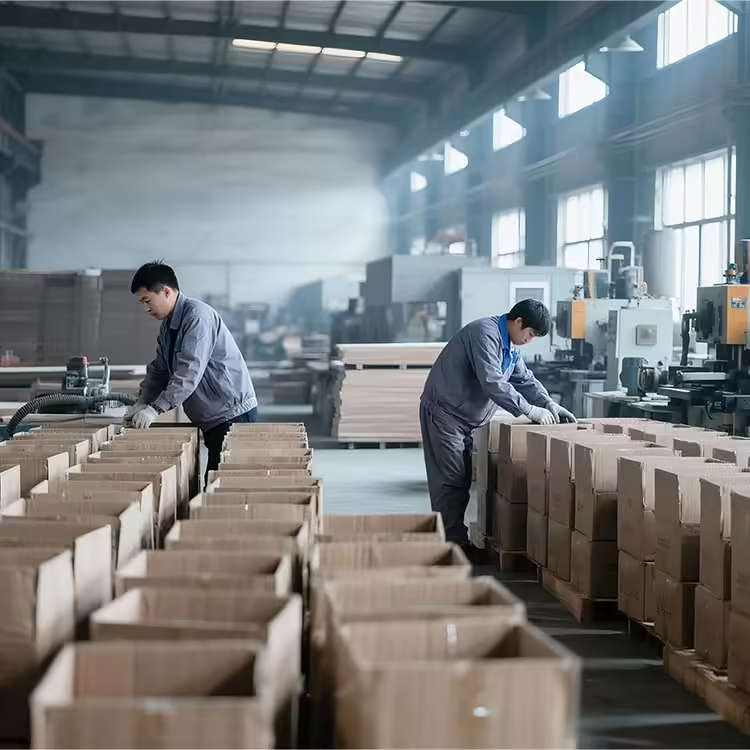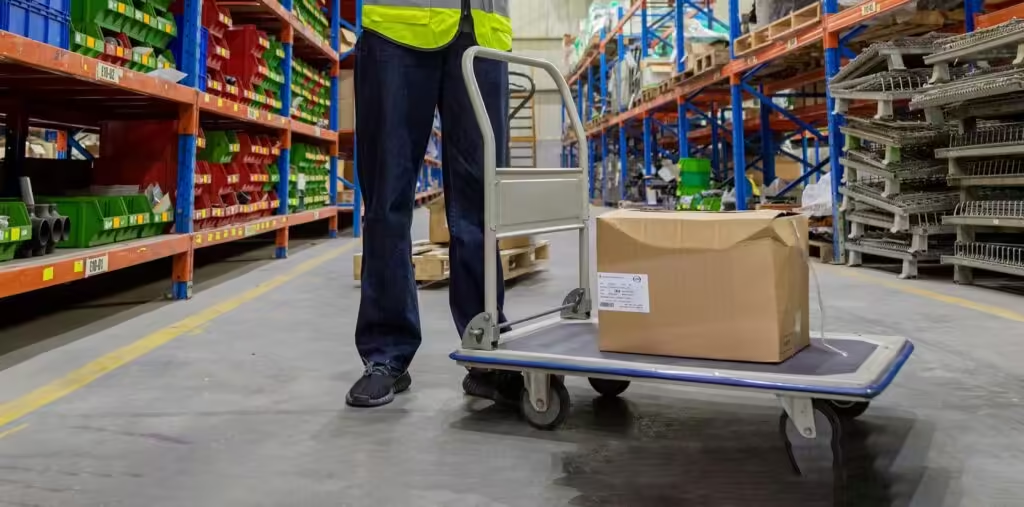Table des matières
Introduction

La manutention efficace des matériaux n'est pas une simple tâche opérationnelle ; c'est un facteur essentiel de productivité, de sécurité et de rentabilité pour toute entreprise moderne. Dans le contexte logistique actuel, le choix d'un équipement de manutention adapté permet d'optimiser les flux de travail, de réduire la main-d'œuvre, de prévenir les dommages coûteux et d'améliorer l'efficacité globale de la gestion d'entrepôt.
Ce guide complet est conçu avec soin pour les acheteurs B2B. Il vise à démystifier la multitude d'options disponibles et à fournir des informations pratiques pour choisir la solution la plus adaptée. chariot de manutention. En analysant les différentes fonctionnalités et les aspects essentiels de l'approvisionnement, les entreprises peuvent prendre des décisions éclairées qui optimisent leur logistique et propulsent leurs opérations vers de nouveaux sommets. Comprendre le rôle spécifique de chaque type de chariot de manutention est primordial pour un investissement réussi, véritable moteur d'efficacité et de croissance.
Divers Chariot de manutention Types : Fonction et application
Le marché regorge de chariots de manutention, chacun conçu pour répondre à des besoins spécifiques et s'adapter à des environnements opérationnels particuliers. Identifier précisément les exigences de votre entreprise est la première étape pour choisir le chariot de manutention idéal.
Essentiel Chariot de manutention Solutions pour usage général


Chariots de déplacement normaux Ces plateformes plates sont des outils indispensables pour le transport de marchandises générales au sein de toute installation. Leur simplicité et leur polyvalence inégalées les rendent essentielles au déplacement quotidien de biens. Manipuler des chariots de déménagement S'appuyant sur cette base, l'intégration de poignées ergonomiques améliore considérablement le contrôle, la maniabilité et la sécurité de l'utilisateur pendant le transport, notamment pour les articles nécessitant un placement ou un déplacement plus précis.
Spécialisé Chariot de manutention Options pour une sécurité et une protection accrues


Pour les charges exigeant une stabilité supérieure ou pour les opérations dans des environnements où l'intégrité des articles est primordiale, des options de chariots de manutention spécialisés sont disponibles :
• Chariots de déménagement antidérapants sont essentielles pour sécuriser les charges instables, en empêchant leur déplacement pendant le transport, ce qui améliore considérablement la sécurité et minimise les dommages aux marchandises.
• Chariots de déménagement recouverts de moquette (Par exemple, le modèle RPWD7050-III) est spécialement conçu pour protéger les objets fragiles aux surfaces sensibles, en les préservant des rayures lors de leur transport. Ce type de chariot de manutention est idéal pour le mobilier ou les produits finis.
• Poupées en caoutchouc (par exemple, PRWD6040) offrent une excellente absorption des chocs et une protection supérieure du sol, ce qui les rend parfaits pour les objets fragiles ou pour une utilisation sur des sols sensibles.
• Chariots à embouts en caoutchouc pour bois dur (par exemple, RHWD7646) combinent la durabilité du bois dur avec les qualités protectrices et adhérentes des extrémités en caoutchouc.
Robuste et peu encombrant Chariot de manutention Variantes

Les entreprises ayant des besoins importants en matière de poids ou un espace opérationnel limité peuvent tirer profit de ces types de chariots de manutention spécialisés :
• Chariots en bois dur (par exemple, HWD7646, HWD7646-4PU) et Chariots en bois dur à plateau solide (Par exemple, SHWD7646) sont fabriqués en bois dur robuste, conçus pour supporter des charges importantes et une manutention intensive. Ils offrent une durabilité exceptionnelle pour le transport de composants ou de machines industrielles lourdes.
• Chariots à plate-forme pliante Les chariots (par exemple, le TC1860) constituent une solution idéale pour optimiser l'espace. Ils offrent une plateforme robuste pour le transport de marchandises et se replient facilement pour un rangement compact lorsqu'ils ne sont pas utilisés, alliant flexibilité et utilisation efficace de l'espace.
Chariot de manutention Solutions pour les articles en vrac et de tailles variées

Pour les entreprises qui traitent un grand volume d'articles en vrac ou de marchandises de dimensions variées, ces modèles de chariots de manutention s'avèrent inestimables :
• Camions à paniers (Par exemple, le camion démontable HWS9066w de 12 boisseaux) est spécialement conçu pour la collecte et la distribution à grande échelle de nombreux articles, petits ou volumineux. Il simplifie la gestion des marchandises en vrac, du linge ou des déchets.
• Wagons et chariots englobe une vaste catégorie de chariots de manutention, y compris des versions spécialisées comme Wagons à parois en bois (par exemple, TC1831), qui offrent un confinement et une protection améliorés pour les articles.
• Wagons en bois avec pare-soleil (par exemple, TC1812M) sont idéaux pour les opérations en extérieur, protégeant le contenu des éléments environnementaux.
• Chariots extensibles (par exemple, le PWD6045SD) offre une flexibilité inégalée, permettant aux utilisateurs d'ajuster la longueur de la plateforme pour s'adapter à des objets de dimensions variées.
• Chariots en contreplaqué (par exemple, PWD4530-Ⅲ/PWD6045-Ⅲ/PWD9060-Ⅲ) offrent une alternative légère mais robuste, adaptée à une gamme diversifiée d'applications.
• Chariots de déménagement en MDF (par exemple, MWD5929) offrent une surface lisse et plane, ce qui les rend adaptés à des tâches de manutention spécifiques où l'intégrité de la surface est cruciale.
Considérations essentielles relatives à vos achats Chariot de manutention Sélection
Le choix du chariot de manutention optimal exige une évaluation minutieuse de plusieurs critères essentiels. Ces critères garantissent que l'équipement répond non seulement aux exigences opérationnelles actuelles, mais contribue également à l'efficacité et à la sécurité à long terme.
Capacité de charge et matériaux de structure : Fondations d'une infrastructure fiable Chariot de manutention
La considération la plus fondamentale est capacité de charge. Il est impératif de s'assurer que le chariot de manutention choisi puisse supporter en toute sécurité et efficacement le poids maximal des articles que vous prévoyez de déplacer. Une surcharge peut entraîner une panne de l'équipement, des accidents et des dommages coûteux. matériau de structure Le matériau du chariot de manutention joue un rôle primordial dans sa durabilité, son poids et son adaptabilité à différents environnements. Les options vont des bois durs et contreplaqués robustes pour les applications intensives et durables aux panneaux MDF plus légers ou au caoutchouc spécialisé pour des besoins spécifiques, chacun offrant des avantages uniques en termes de résistance, de résistance aux intempéries et d'absorption des chocs.
Type de roue et maniabilité : se déplacer dans son espace de travail

Le type de roues Le choix des roues de votre chariot de manutention influence considérablement sa maniabilité, sa stabilité et ses performances sur différents types de sols. Différents matériaux (caoutchouc plein, pneumatiques, plastique, etc.) offrent des avantages distincts : les roues en caoutchouc assurent un excellent amorti, un fonctionnement silencieux et protègent les sols, tandis que les matériaux plus durs garantissent une grande durabilité sur les surfaces lisses. La configuration des roues, par exemple les roulettes pivotantes pour les virages serrés ou les roulettes fixes pour une meilleure stabilité en ligne droite, détermine également la facilité de déplacement du chariot dans vos locaux.
Ergonomie et dimensions : améliorer l'expérience utilisateur et l'adéquation opérationnelle
Ingénierie humaine Les principes de conception des chariots de manutention sont de plus en plus intégrés afin d'améliorer le confort de l'opérateur et de réduire la fatigue. Les caractéristiques qui facilitent la poussée, la traction et la direction peuvent améliorer considérablement la productivité et diminuer les risques d'accidents du travail. De plus, dimensions et applicabilité Le chariot de manutention doit être adapté à votre environnement opérationnel. Des éléments tels que la largeur des allées d'entrepôt, le dégagement des cadres de porte et les dimensions des ascenseurs sont essentiels pour garantir que l'équipement choisi puisse se déplacer librement et efficacement au sein de votre infrastructure existante.
Services de personnalisation : Solutions de manutention sur mesure pour des besoins uniques
De nombreuses entreprises sont confrontées à des défis opérationnels uniques auxquels les produits standard ne peuvent pas répondre pleinement. C'est là que… services de personnalisation Devenir un atout inestimable. Les principaux fabricants soutiennent la collaboration ODM/OEM, leur permettant de concevoir et de fabriquer des solutions de manutention sur mesure répondant précisément aux exigences spécifiques de chaque client. La possibilité de recevoir des échantillons personnalisés en seulement 15 jours peut accélérer considérablement les délais de vos projets et garantir une intégration parfaite du produit final dans votre flux de production.
Évaluation de la solidité et de l'engagement des fournisseurs envers la qualité
La performance et la fiabilité à long terme de votre matériel de manutention sont inextricablement liées aux capacités et aux protocoles d'assurance qualité de son fabricant.
Fabrication intelligente et contrôle qualité rigoureux
Un fournisseur véritablement réputé fait preuve d'une grande profondeur une force de production intelligente et un engagement indéfectible envers la qualité. Cet engagement se traduit souvent par l'adhésion à des valeurs fondamentales, l'établissement d'un cadre scientifique et système de gestion en boucle fermée complet. Surtout, ils devraient mettre en œuvre un système d'inspection à trois niveaux couvrant les matières premières, les processus de production et les produits finis, garantissant l'excellence à chaque étape de la création d'un chariot de manutention. L'intégration de lignes de production automatisées d'emboutissage et de soudage améliore encore la précision, la constance et l'efficacité, contribuant à un résultat impressionnant capacité de production annuelle de 1,2 million d'unités.
Innovation et recherche et développement dans la manutention
Le secteur de la manutention est en constante évolution, porté par la recherche permanente d'une efficacité accrue et de solutions innovantes. Un indicateur fort du caractère novateur d'un fournisseur est son investissement conséquent dans… innovation et R&D. Les entreprises qui se vantent d'une une équipe d'ingénierie dédiée de 20 personnes capable de lancement de plus de 15 nouveaux modèles de produits par an sont à l'avant-garde de cette évolution, garantissant l'accès à des solutions de manutention de pointe qui s'adaptent aux exigences changeantes du marché. Cette innovation continue assure la pertinence et la compétitivité de vos investissements dans les chariots de manutention.
Tableau : Détaillé Chariot de manutention Caractéristiques et avantages
| Type de chariot de manutention | Fonction principale | Caractéristiques principales | Avantages |
| Chariot mobile normal | Transport général de marchandises | Plateforme plate, construction robuste. | Polyvalent, facile à utiliser et économique pour les besoins de base. |
| Chariot de déménagement antidérapant | Transport sécurisé de chargement | Surface antidérapante, souvent caoutchoutée. | Empêche le déplacement des objets, améliore la sécurité, réduit les dommages. |
| Chariot à plateforme pliable | Transport et stockage efficaces | Poignée/plateforme pliable, souvent sur roulettes. | Peu encombrant, facile à ranger, adapté à des tâches variées. |
| Chariot en bois dur | Capacité de charge élevée | Terrasse en bois massif, coins renforcés. | Capacité de charge élevée, durabilité extrême, longue durée de vie. |
| Camion panier | Collecte de matériaux en vrac | Grande capacité, conception ouverte sur le dessus, parfois pliable. | Idéal pour les petits objets, le linge, les déchets ou les petites pièces. |
| Chariot extensible | Transport d'articles de longueur variable | Mécanisme de réglage de la longueur. | Convient à des articles de tailles diverses, flexible. |
| Chariot en caoutchouc | Protection des objets fragiles | Surface/roues en caoutchouc, absorbant les chocs. | Protège les objets fragiles et les sols, réduit le bruit. |
| Chariot en contreplaqué | Usage général léger | Construction en contreplaqué multicouche. | Plus léger, bon rapport résistance/poids. |
| Chariot de déménagement en MDF | Manipulation de surfaces lisses | Plateau en MDF lisse et plat. | Idéal pour les articles nécessitant une surface impeccable et non abrasive. |
| Wagon à côtés en bois | Transport en conteneur | Panneaux latéraux en bois surélevés. | Empêche les objets de tomber, assure le maintien. |
Pratiques durables et logistique verte dans la manutention

À une époque marquée par une prise de conscience environnementale croissante, pratiques de durabilité Le choix des fournisseurs d'équipements de manutention n'est plus une option, mais une nécessité absolue. L'avenir du secteur de la manutention est indissociable de ce choix. logistique verte et développement durable.
Un engagement envers innovation verte cela signifie que les fabricants de manière proactive optimiser les matériaux, réduire les déchets et adopter des procédés économes en énergie tout au long de leurs opérations. Cette approche holistique garantit que des solutions sur mesure sont fournies, répondant non seulement aux besoins des clients, mais aussi au respect de la planète. En s'associant à leurs clients pour bâtir un avenir durable, un produit responsable à la fois—les entreprises contribuent de manière significative à la réduction de l'impact environnemental de la logistique. Cela inclut des efforts visant à réduire la consommation d'énergie et les émissions de carbone, répondant ainsi aux pressions auxquelles sont confrontées les méthodes de traitement traditionnelles. Cet engagement en faveur de la responsabilité environnementale et du développement durable témoigne d'une démarche proactive en matière de protection de l'environnement.
Portée mondiale et partenariats de confiance
La vaste expérience et la forte présence sur le marché d'un fournisseur d'équipements de manutention sont de solides indicateurs de sa fiabilité et de sa crédibilité. Une entreprise établie en 1998, spécialisée dans la conception, la fabrication et distribution mondiale d'équipements de manutention haut de gamme, brings decades of expertise to the table.
Proof of their established quality and reliability lies in their products being exported to over 50 countries and regions worldwide, including prominent markets such as North America, Europe, Japan, and Australia. This global footprint, coupled with their status as a national high-tech enterprise, underscores their technical prowess and commitment to excellence. Adhering to a business philosophy centered on “Integrity-based, Growing Together” fosters long-term, win-win partnerships, ensuring that clients receive not just products, but also a foundation of trust and consistent quality. This extensive global layout is a unique competitive advantage.
Amélioration de l'efficacité et logistique intelligente
Beyond basic transport, modern material handling carts are integral to advanced smart logistics solutions. The right equipment plays a crucial role in enhancing warehouse management efficiency. By optimizing handling processes, businesses can lower operational costs and significantly reduce manual labor intensity, thereby improving the overall working environment for employees. Integrating intelligent material handling equipment contributes to a seamless flow of goods, minimizing bottlenecks and maximizing throughput. Whether through specialized material handling cart designs or comprehensive system integration, the goal is to drive your business to new heights of efficiency.
Assistance technique et service après-vente

The journey of purchasing a material handling cart doesn’t end with the transaction; it extends to the ongoing support provided by the supplier. Access to professional customer support, readily available via phone and email, is crucial for addressing any queries or operational challenges. Furthermore, seeking expert advice and specialized consultations can provide invaluable insights for optimizing your material handling strategy and ensuring that the selected equipment truly meets your unique needs. A dedicated partner offers more than just products; they provide continuous support and expertise.
Conclusion
The strategic selection of a material handling cart is a pivotal decision that profoundly influences a business’s operational efficiency, safety standards, and financial viability. By comprehensively understanding the diverse range of material handling cart types, diligently considering essential procurement factors such as load capacity, materials, and customization options, and thoroughly evaluating the strength and commitment of potential suppliers, B2B buyers can make truly informed and impactful choices.
Partnering with a manufacturer that champions quality, embraces innovation, and integrates sustainable practices ensures not only access to tailored, high-quality material handling solutions but also contributes to a more responsible and efficient future. Investing wisely in the right material handling cart today is a strategic commitment to enhanced productivity and sustainable growth tomorrow.
FAQ
Q1: What are the most essential types of chariots de manutention for businesses with diverse operational needs?
A1: For businesses with diverse requirements, essential material handling cart types include normal moving dollies for general tasks, anti slip dollies for safety, folding platform trucks for space efficiency, hardwood dollies for heavy loads, and basket trucks for bulk item management. Additionally, specialized wagons and extendable dollies cater to unique transport challenges.
Q2: How quickly can I expect to receive a customized chariot de manutention solution?
A2: Many leading manufacturers offer rapid customization services, supporting ODM/OEM cooperation. It’s often possible to receive custom samples in as fast as 15 days, allowing for quick evaluation and integration into your operations.
Q3 : Quels sont les critères de qualité clés à privilégier lors de l'évaluation d'un fournisseur d'équipements de manutention ?
A3: When evaluating suppliers, prioritize those who implement a scientific and comprehensive closed-loop management system. Look for companies that utilize a three-tier inspection system for raw materials, production processes, and finished products, as this ensures exceptional quality and reliability in every material handling cart.
Q4: How do chariots de manutention contribute to sustainable business practices?
A4: Modern material handling carts contribute to sustainability through optimized material usage, reduced waste, and energy-efficient manufacturing processes. Choosing suppliers committed to green innovation helps reduce environmental impact, lower energy consumption, and decrease carbon emissions in logistics.
Continuez la conversation !
Vous avez aimé cet article ? Rejoignez notre communauté pour plus d'informations sur le secteur, des discussions en temps réel et des actualités exclusives. Retrouvez-moi ici :
→ Facebook: Qingdao Kinkayo Industrie et Commerce Co., Ltd.
→ YouTube : Industrie et commerce de Kinkayo
Explorons ensemble l’innovation – connectez-vous maintenant !



